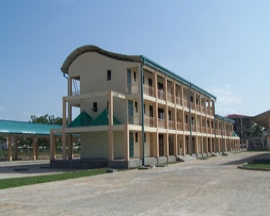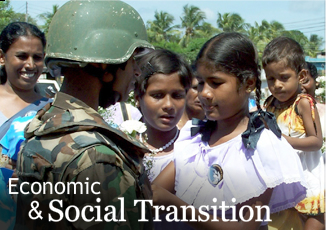Ilankai Tamil Sangam29th Year on the Web Association of Tamils of Sri Lanka in the USA |
||||||
 Home Home Archives Archives |
A Solution, But Not for the ProblemSri Lanka touts economic development as solution to ethnic conflictby Peter Ratnadurai, September 7, 2008
INTERNATIONAL support for the Rajapaksa regime is a reward for the latter's successful marketing strategy. Tamil people's grievances may be rooted in lack of rights, but Tamils who appeal to the International Community (IC) need to bear in mind that states base their foreign policy on national interest and not on moral sentiments. Thus, while Tamils have been crying foul over human rights, Sri Lanka has been able to muster the support of the IC by promising a "decisive" end to the ethnic conflict by military means.
Recent events in Kosovo and South Ossetia only go to show how fluid international opinion is on such "taboo" matters as "separatism". A state's opinion on and attitude towards a change in the status quo in any part of the world is based on how the state perceives the change to affect its military, economic and cultural interests; collectively known as national interest. In Sri Lanka what the IC wants is stability, which can only be achieved by a lasting end to the ethnic conflict. Sinhala-Buddhist chauvinism has been the overwhelming cause of Sri Lanka's ethnic conflict. From giving Buddhism "foremost place," to making Sinhala the "only official language," the Constitution of Sri Lanka has been weaved with ethnic discrimination, which in turn caused symptoms of economic and political inequality, which eventually has given way to a form of violent conflict: ethnic separatism. Even last week, the saffron-clad agents of intolerance were giving glimpses of the sort of supremacist ideologies that caused and continue to sustain the civil war. The guardians of Sinhala-Buddhism (as opposed to Buddhism in general, which preaches peace) went on a rampage in Colombo, desecrating a Hindu temple and crossed swords with the Supreme Court by refusing to "respect" the institution. Yet, some in the IC, especially the media, do not acknowledge the role of the "war monks" in the civil war.
The Beijing Olympics gave a rare glimpse into how the "free media", the pillars of liberal democracies, present the "truth" to suit their respective audience. For the first time in a century, medal tables were ranked by number of medals won by each country rather than the winners, i.e. gold medallists, each country produced. Likewise, the "free media" covers the Sri Lankan conflict in line with the perceived interests of the IC, which, as marketed by Rajapaksa, is the war effort to establish "lasting stability." To date, Tamils have been making a rights-based case for self-governance in their historic homeland, by appealing to the moral high ground, on which many members of the IC appear to be sitting. Tamils have been highlighting the economic and social symptoms rather than the ethnic nature of the anti-Tamil discrimination: while ancient Tamil kings Ellalan and Sankiliyan are referred to as "terrorists," their Sinhala counterparts Gamunu and Gajaba are regiments in the Sri Lanka Army. The Rajapaksa regime has succeeded in selling their proposal of conquer, hold limited elections and implement economic development as a viable solution to the ethnic conflict. Based on its case studies in African civil wars, the IC also believes that a solution to the symptoms of the ethnic discrimination can bring "lasting stability." As a consequence, the Sri Lankan government has been able to gather a billion dollars for "developing" the north-east and secure impunity against charges of human rights violations. While billions of dollars are much welcome by the deprived population of a war-torn region, economic neglect was never the main cause of the conflict; therefore, logic has it, economic development alone cannot be the genuine solution. Rajapaksa's successful marketing has, to some degree, benefited from the IC's ignorance over the causes of Sri Lanka's civil war. To that extent, blame lies with the Tamils, especially those in the Diaspora, for not presenting the two state solution as the only viable method for achieving lasting stability across the island. |
|||||
|
||||||

